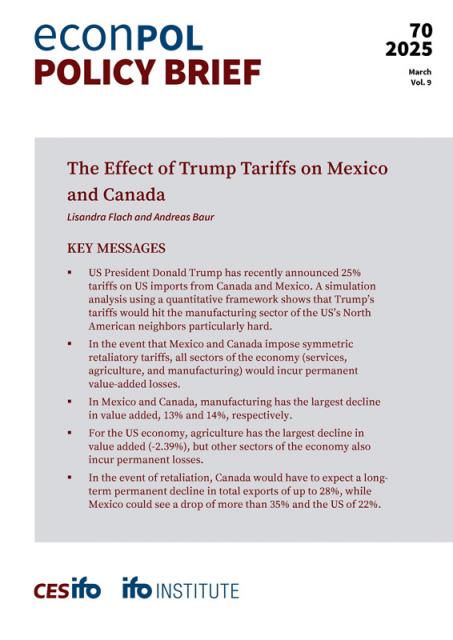If you would like to receive the latest press releases from EconPol Europe, email info@econpol.eu
Press releases
Only Estonia and Lithuania Achieve NATO’s 2 Percent Target with Sound Public Finances
Of 25 European NATO countries including Sweden only Estonia and Lithuania achieved NATO’s 2 percent target with sound public finances in 2023. This is the conclusion reached by researchers at the ifo Institute in a new EconPol study. Finland, Greece, Hungary, Latvia, Poland, Romania, and Slovakia spent more than 2 percent of their economic output on defense, but at the same time had public debt of more than 60 percent or a budget deficit of more than 3 percent in relation to economic output. This means they are above the EU’s Maastricht limits.
Formation of Geopolitical Blocs Would Hit the EU’s Pharmaceutical, Machinery, and Automotive Industries Particularly Hard
A division of the global economy into geopolitical blocs would hit European pharmaceutical manufacturers, automotive manufacturers and suppliers, and manufacturers of machinery and equipment particularly hard. This is the finding of a study conducted by the EconPol research network and presented today in Brussels. Although agriculture and mining could see small increases in value added, they account for only a small proportion of the EU’s total economic output.
Emigration Can Lead to More Votes for Right-Wing Parties in Poland
Emigration from Poland can have a strong impact on elections, according to a new study in the journal EconPol Forum. Higher emigration causes a significant increase in right-wing votes: a 1 percent increase in the number of emigrants increases the share of right-wing votes by 0.25 percent. The opposite is true for the left-wing parties: a 1 percent increase in the number of emigrants causes a 0.57 percent decline in left-wing parties’ share of the vote.
Germany’s Middle Class Has One of the Highest Tax Burdens in Europe
In a European comparison, the tax and contribution burden for middle-class incomes is highest in Denmark, Belgium, Germany, Finland, Lithuania, Slovenia, and the Netherlands. By contrast, France, Poland, Italy, Luxembourg, Sweden, and Austria impose average tax burdens on their middle classes, while the tax burden for the middle class is lowest in Spain, Greece, Estonia, Portugal, Cyprus, Bulgaria, and Romania. These are the findings of a study conducted by the ifo Institute and EconPol Europe on behalf of the Hanns Seidel Foundation.
German Automotive Industry Employees Hold Top Position in E-mobility Skills
Employees in the German automotive industry are better qualified in e-mobility than employees in other Western countries. This is a finding by EconPol Europe researchers using data from the career network LinkedIn. In the German automotive industry, 6.2 percent of the employees on the online platform have skills in e-mobility. In the Italian automotive industry, the figure is 4.6 percent; in the US, 3.7 percent; in France, 3.3 percent; and in Spain, 2.4 percent. All values are based on employees’ self-reported data from 2023.
